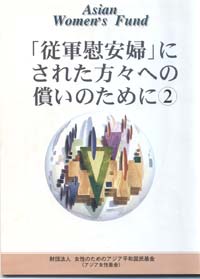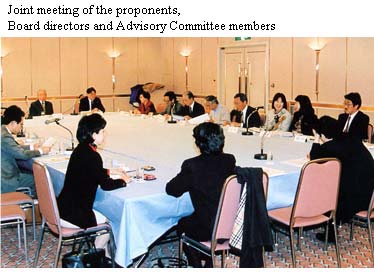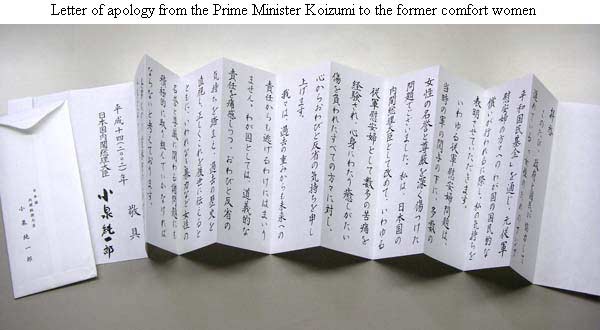 |
Establishment of the AW Fund, and the basic concept of its projects |
  |
| |
 However, many activist groups in the Republic of Korea demanded that the Japanese Government apologize and provide compensation, and stated that victims should not receive "remuneration" from "a private organization." This led to the Government of the Republic of Korea changing its stance. After that, the activist groups insisted that war crimes were at the heart of the issue, and called on the Japanese Government to recognize its legal responsibility and punish those responsible. The groups brought these demands to the UN High Commissioner for Human Rights and other organizations. However, many activist groups in the Republic of Korea demanded that the Japanese Government apologize and provide compensation, and stated that victims should not receive "remuneration" from "a private organization." This led to the Government of the Republic of Korea changing its stance. After that, the activist groups insisted that war crimes were at the heart of the issue, and called on the Japanese Government to recognize its legal responsibility and punish those responsible. The groups brought these demands to the UN High Commissioner for Human Rights and other organizations.
On 4 January 1996, Dr. Radhika Coomaraswamy, Special Rapporteur of the UN Commission on Human Rights on Violence against Women, presented a report on investigations of the comfort women issue conducted in North Korea, the Republic of Korea and Japan. Her report, annexed to a report to the High Commissioner for Human Rights, regards the comfort women issue as "military sexual slavery," and asserts that the Japanese Government should accept legal responsibility for the violation of international law. The Special Rapporteur wrote that the Japanese Government had accepted moral responsibility for the existence of the comfort women, and that she "considers this a welcome beginning." She also wrote that she saw the Asian Women's Fund "as an expression of the Japanese Government's moral concern for the fate of the comfort women." However, she stated that this did not exempt the Government from "the legal claims of the comfort women under public international law." In addition, she called on the Japanese Government to accept legal responsibility, pay compensation, make a full disclosure of documents and materials in its possession, issue a public apology, raise awareness by amending educational curricula to reflect historic realities, and punish perpetrators as far as possible.(Full Text ) )
Against this background, members of the newly established Asian Women's Fund - the proponents, Directors and Advisory Committee members - collaborated in discussions aimed at developing a framework for Fund projects. Then, after discussions with relevant government officials, decisions were taken regarding the fundamentals for Fund projects. These fundamentals were detailed in the second pamphlet entitled "Jyugun Ianfu" ni Sareta Katagata eno Tsugunai no Tameni (For the Atonement to Those Women were made to become the Comfort Women), which was published in September 1996.
|
 |
|
Based on the recognition by the Japanese government of its moral responsibility and its clear expression of remorse and apology, it was decided that the Asian Women's Fund together with the government would implements the national atonement projects participated in by both the government and the people of Japan. The projects were to be implemented for former comfort women who had been recognized as such by the authorities of the relevant country or region, or by private organizations commissioned by the authorities
The projects expressing the atonement of the Japanese Government and people have three major elements. The first element is the provision of "atonement money" from the Japanese people to former comfort women. The money, 2 million yen per person, comes from Japanese people's donations.
|
 |
|
The first element is a letter from the Prime Minister of Japan to the former comfort women. The letter indicates that at the heart of the comfort women issue is the fact that the honor and dignity of women were gravely affronted with the involvement of the former Japanese military, acknowledges moral responsibility for these facts, and expresses heartfelt feelings of apology and remorse to all those who underwent many painful experiences and suffered incurable trauma. The letter also states a resolve to face up squarely to history and accurately convey that history to future generations. The letter is presented to each former comfort woman by the Asian Women's Fund, together with a letter from the President of the Fund (see Appendix 12), to indicate even more clearly to the victims the position of the Japanese Government and people.
| Letter from Prime Minister to the former comfort women
The Year of 1996
Dear Madam,
On the occasion that the Asian Women's Fund, in cooperation with the Government and the people of Japan, offers atonement from the Japanese people to the former wartime comfort women, I wish to express my feelings as well.
The issue of comfort women, with an involvement of the Japanese military authorities at that time, was a grave affront to the honor and dignity of large numbers of women.
As Prime Minister of Japan, I thus extend anew my most sincere apologies and remorse to all the women who underwent immeasurable and painful experiences and suffered incurable physical and psychological wounds as comfort women.
We must not evade the weight of the past, nor should we evade our responsibilities for the future.
I believe that our country, painfully aware of its moral responsibilities, with feelings of apology and remorse, should face up squarely to its past history and accurately convey it to future generations.
Furthermore, Japan also should take an active part in dealing with violence and other forms of injustice to the honor and dignity of women.
Finally, I pray from the bottom of my heart that each of you will find peace for the rest of your lives.
Respectfully yours,
Ryutaro Hashimoto
Prime Minister of Japan
(Subsequent Prime Ministers who signed the letter are: Keizo Obuchi, Yoshiro Mori and Junichiro Koizumi)
|
|
Letter from AWF President to the former comfort woman
Dear Madam,
The Asian Women's Fund, established in cooperation with the Government and people of Japan, herein conveys to you the sense of atonement held by the Japanese people for the unbearable suffering you were forced to endure as a wartime "comfort woman."
At a certain time of war in the past, many comfort stations were established with an involvement of the former Japanese armed forces, and many women were recruited and forced to become "comfort women" for officers and soldiers. There were cases where young women, including 16-17 year-olds, were recruited without an indication of the fate before them, and, in occupied areas, there were cases where direct coercive means were also used. I understand that you were one of such victims.
This cruelty truly denigrated the fundamental dignity of women. As clearly acknowledged in the Prime Minister's letter, the Government and people of Japan today bear moral responsibility for the acts inflicted upon you. We also extend our heartfelt apologies to you.
I know that you not only experienced intolerable suffering during the war, but through more than 50 years since, have lived with physical damage and cruel memories.
In such recognition, the Asian Women's Fund, in cooperation with the Government of Japan, appealed to the Japanese people in a year-long campaign for contributions. Many thoughtful people responded with contributions to the AWF.
Many letters accompanying contributions expressed sincere apologies and sense of atonement shared in the hearts of the Japanese people.
We know that the pain you have endured could never be atoned for with words of apology or with a monetary payment. However, we sincerely hope that you will accept our atonement as a token of our people's resolve to never repeat what happened in the past.
In cooperation with the Government of Japan, the Asian Women's Fund will launch medical and welfare assistance programs as one of the AWF's activities for atonement, the intention of which is to fulfill our moral responsibilities.
The AWF will furthermore strive to make known the true facts relating to the "comfort women" issue, and proceed with study and research programs which examine relevant documents and materials to serve as lessons of history.
Since you stepped forward to pronounce your case, our eyes have been opened anew to the events of the past. The Japanese people will never forget your suffering and your courage. With all our hearts, we sincerely hope that you are able to find somewhat more peace in your life.
Sincerely,
Bunbei Hara
President
The Asian Women’s Fund
(Subsequent President who signed the
letter is Tomiichi Murayama) |
The second element is the provision of "atonement money" from the Japanese people to former comfort women. The money, 2 million yen per person, comes from Japanese people's donations.
The third element is medical and welfare support projects. These projects are implemented to fulfill the moral responsibility that the Japanese Government has acknowledged, and involve the disbursement of a total of about 830 million yen from government funds over a 5-year period, for victims' medical care and welfare. The amount provided in each country or region was adjusted to take into account the cost of living there - the equivalent of 3 million yen per recipient was decided upon for the Republic of Korea and Taiwan, and 1.2 million yen per recipient for the Philippines. Although the program is applied differently in the Netherlands, the amount provided was equivalent to 3 million yen per recipient.
|
  |
|
|
|

